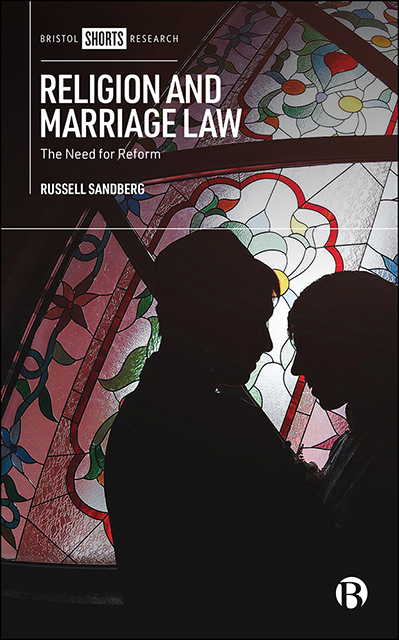Ten - Conclusions: Relationship Solutions
Published online by Cambridge University Press: 18 April 2023
Summary
It is difficult to dispute that the law on marriage in England and Wales is antiquated and is in need of reform. One compelling reason for reform is the fact that many wedding ceremonies now take place outside the Marriage Act 1949. Such couples then have to undergo the cost and inconvenience of undergoing an additional civil ceremony which is of little meaning to them or, even worse, they wrongly assume that the original wedding ceremony was legally binding and find out only when the relationship ends that they are denied the legal protections given to married couples. The inadequacy of the current law is underlined by two issues that have come to the fore in recent years that highlight the injustice caused by the current law: the issues of unregistered religious marriages and of non-religious marriages.
Reform is needed to deal with these issues. In relation to non-religious marriages, there is a need to give marriages conducted by belief organisations and independent celebrants legal effect. However, if ceremonies by independent celebrants are made legally binding, then there is no reason to restrict the organisations who can conduct weddings to religious or belief organisations. Permitting all organisations to nominate celebrants – including umbrella organisations representing independent celebrants – would provide the preferable way forward. However, failing that, if the law is to be limited to religion or belief organisations then a rigorous definition needs to be employed of religion or belief and recognition also needs to be given to independent celebrants. To include ceremonies by celebrants from belief organisations but to exclude ceremonies by independent celebrants would only replace one discrimination and injustice with another.
In relation to unregistered religious marriages, a step forward would be provided by removing the obstacles which currently indirectly discriminate against some religious groups which insist that such marriages must take place in a place of religious worship and use prescribed words in order to be legally binding. This would be likely to reduce the numbers of unregistered religious marriages. It would prevent those unregistered religious marriages that occur due to the strictness of the law: where the requirement for a building means that couples opt for a religious only marriage or where they are unaware of the legal requirements. However, some unregistered marriages would still exist. Some such marriages would not be problematic.
- Type
- Chapter
- Information
- Religion and Marriage LawThe Need for Reform, pp. 145 - 148Publisher: Bristol University PressPrint publication year: 2021



